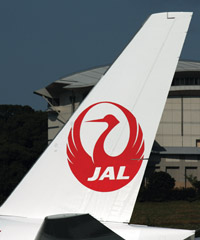Opinion
JAL's Airbus deal good for Japan
November 1st 2013
The impact of Japan Airlines’ (JAL) groundbreaking US$9.5 billion order for 31 A350s plus 25 options has gone far beyond a major refleeting decision. It turned Japan’s concept of corporate obligation on its head. Read More »
After decades of dependency on Boeing, analysts initially said the JAL order, which will also bring Rolls-Royce’s Trent XWB engines to Japan, would reduce Boeing business at Japanese aerospace manufacturers.
 |
Major Japanese aerospace manufacturers such as Mitsubishi Heavy Industries and Kawasaki Heavy Industries have contracts with Boeing. The U.S. aircraft maker has built mutually dependent relations with Japanese parts suppliers based on its dominance in the Japanese airliner market.
But when the dust settled around the deal, more measured opinions prevailed. It is believed Japanese manufacturers could benefit from new opportunities with Airbus.
Until now, many Japanese suppliers have worked exclusively with Boeing, displaying almost feudal loyalty. But Boeing has a huge order book worldwide and many components of these aircraft, including lightweight hi-tech plastics, are produced in Japan.
In Japan, where tradition dies very hard, the reaction to the JAL switch to Airbus amounted to shock and awe.
But veteran JAL insiders knew Airbus had come close to breaking the Boeing hold on Japan 23 years ago.
In 1990, JAL was weighing the competing merits of two airplane types. The airline’s operations managers favoured the A330 over the MD-11. At the last minute, a decision was taken to go with the American manufacturer, based on past obligations, the U.S.-built tri-jet.
The JAL president at the time, the late Susumu Yamaji, sent a letter to former Airbus CEO, Jean Pierson, which complimented the Airbus sales team. “It was one of the hardest decisions I’ve had to make,” he wrote. It was also a bad choice for JAL.
JAL also had a close, sole supplier relationship with U.S. engine maker, Pratt and Whitney in the 1980s. However, acute problems with the P&W parts supply chain forced JAL to sever the relationship at a time when power plants for the 747-400 were under consideration.
The decision in 1987 to seek an alternate supplier was drastic and heart-breaking – and not only for P&W – because JAL regarded the engine maker “like family”.
As a result, the battle for JAL’s -400 engine order was mostly between GE and Rolls-Royce and the Americans won the contract – and P&W and JAL still do business.
Boeing and JAL were locked into a relationship that brought great rewards for both companies. Heady with new-found financial freedom after full privatization in 1987, JAL had splurged on the then new 747-400, ordering a staggering 74 of the type plus options.
When Japan’s bubble economy burst in the early 1990s and travel demand plummeted, JAL had to renegotiate the deal. An understanding Boeing cooperated and changed some of the over-ordered 747-400s into smaller aircraft, such as 737s, 767s and eventually the 777. The final total of 747-400s in the fleet was 40. JAL’s management broadly felt that staying with Boeing was inevitable and a necessary obligation.
Japanese business relationships often depend heavily on loyalty and obligation. These factors were key elements in JAL’s earlier position on procurement. But the 2010 collapse of the former JAL and the rehabilitation of the company under Kyocera business guru, Kazuo Inamori, emboldened JAL’s management, because they were unfettered by the past. Inamori had been critical of the airline’s purchasing policies and urged revision.His influence can be seen in the new order.
Boeing has endured criticism in Japan because of the long delivery delays of the new B787, followed heartbreakingly by the months-long grounding of the Dreamliner after battery combustion issues.
But at the Airbus announcement press conference, JAL’s Ueki said he didn’t take into account Boeing’s history or supplier relationships in Japan.
He also emphatically stated that the decision to buy Airbus aircraft had “nothing to do with the Dreamliner battery situation”…a very diplomatic response raising more than a few eyebrows. Many analysts thought the incident had highlighted the dangers of all JAL’s eggs being in Boeing’s basket.
Ueki said that the airline had started examining the A350 late last year, before the Dreamliner grounding. When asked if JAL had taken into account the interest of Japan’s aerospace industry when he decided to go with Airbus, he said the interest of JAL was the only factor and added he did not consult the government.
Next up will be All Nippon Airways’ decision when its B777 fleet comes up for renewal. Being able to play Airbus and Boeing off against each other, it stands to benefit from JAL’s bold step.